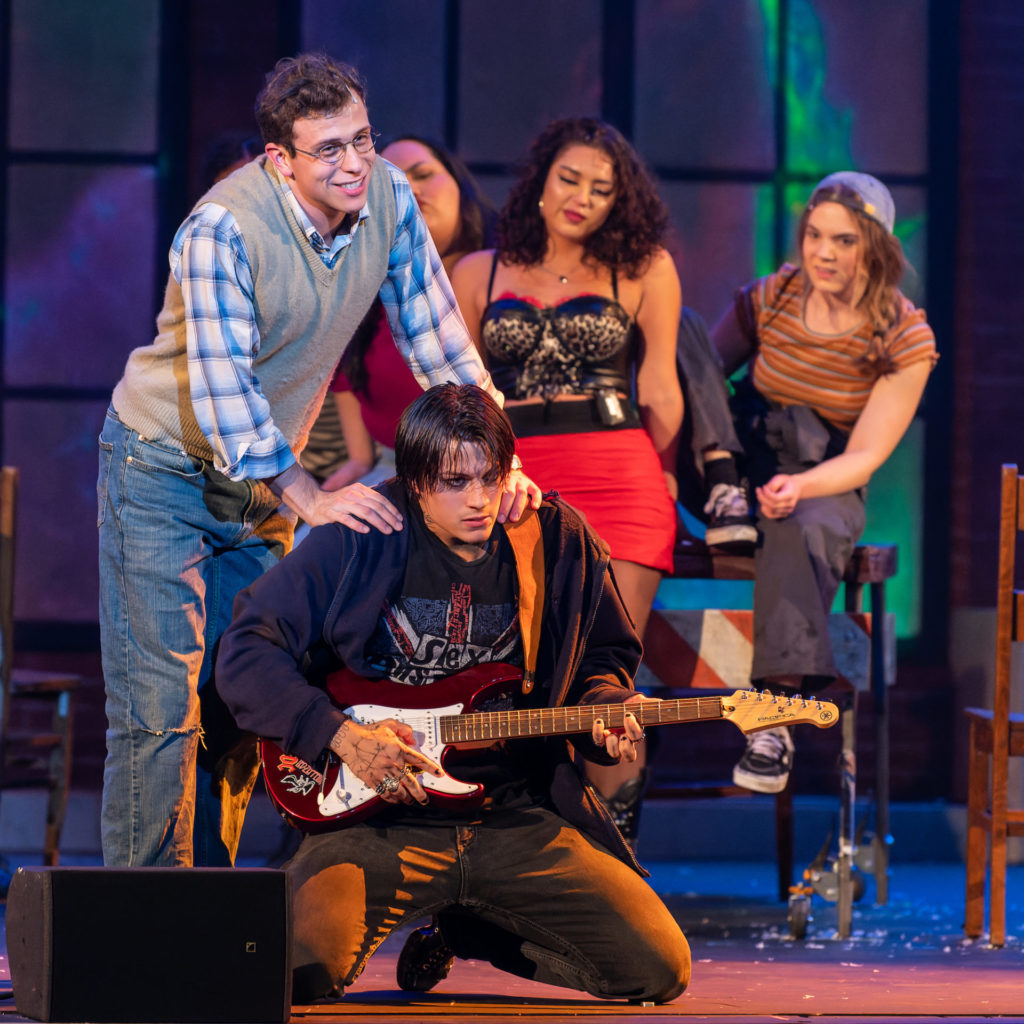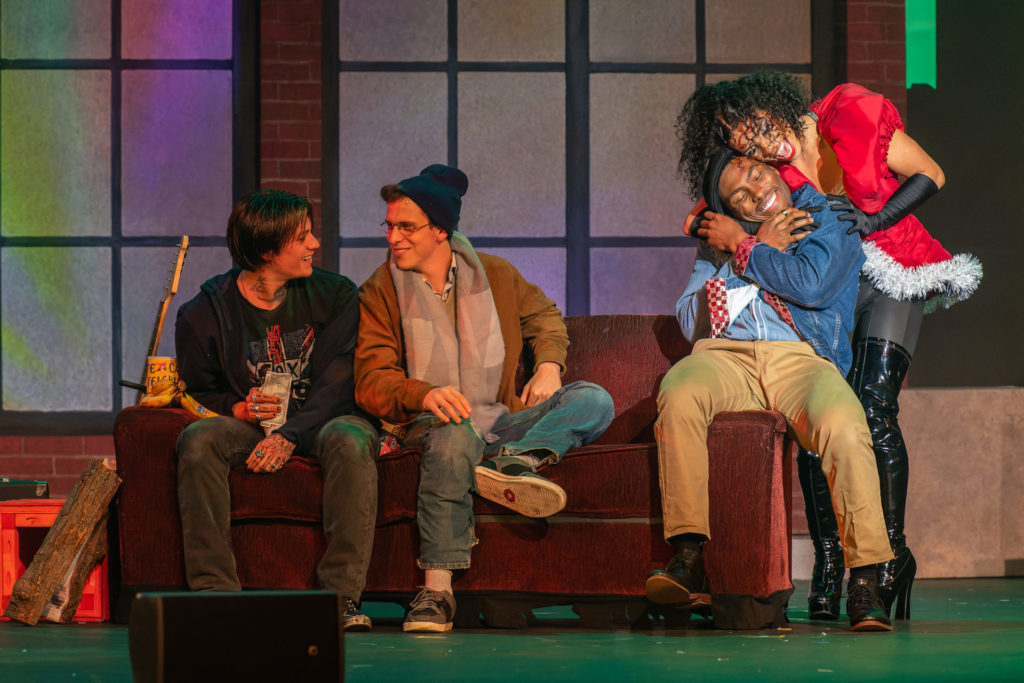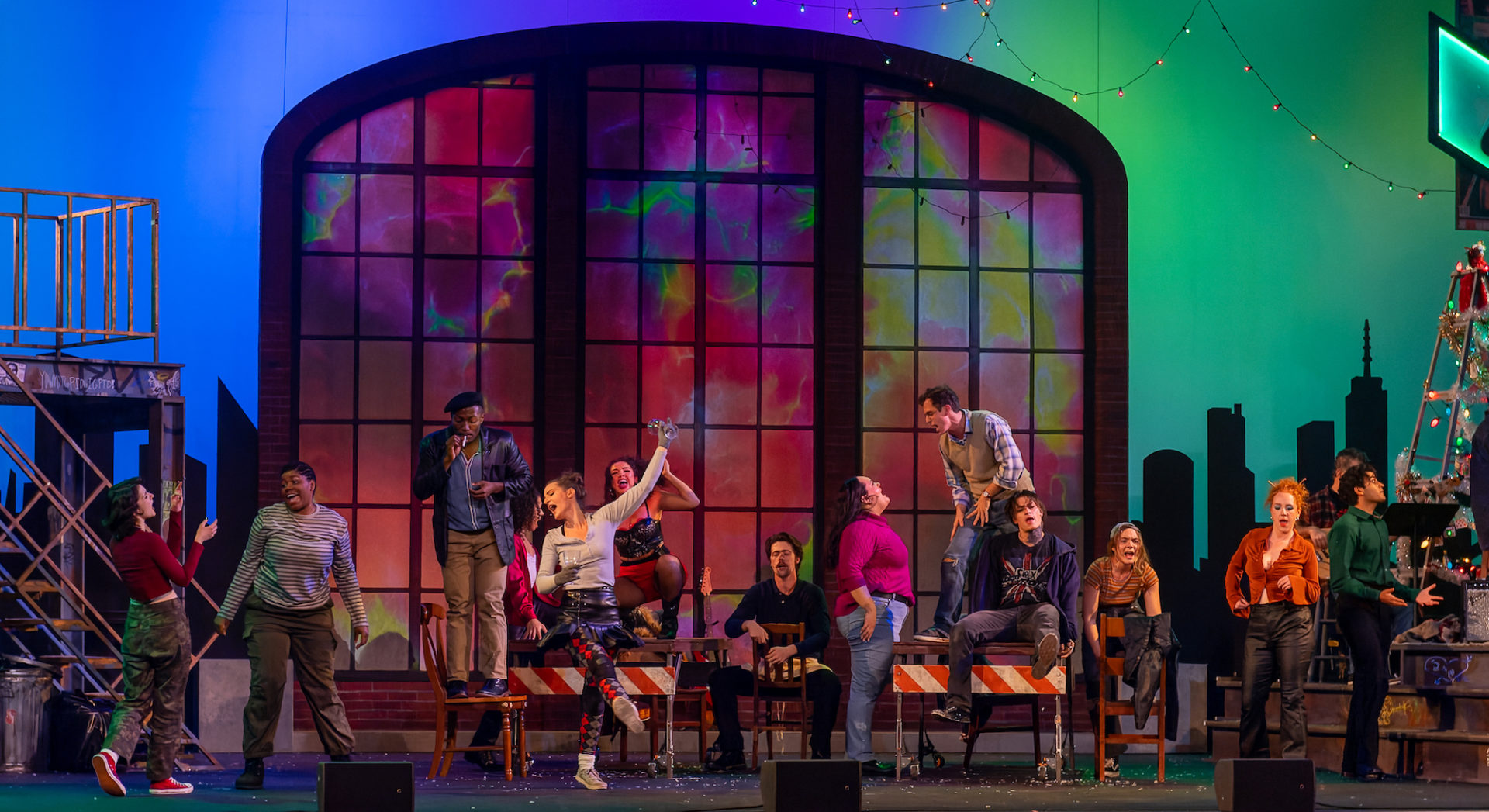On Thursday October 26th, the Krannert Center for the Performing Arts’ production of Jonathan Larson’s Tony and Pulitzer Prize-winning musical drama Rent (1996) opened at the Virginia Theatre. Rent famously re-creates the Parisian bohemians of Giacomo Puccini’s La Bohème in 1989 New York, and is equally famous for its commentary on the aftermath of the AIDS crisis. While it opened to both critical and audience acclaim, 27 years on it inspires strong preferences. This is probably a musical that you either love or hate. It has been fashionable in the past to call it dated, or to judge how the musical has aged, or to make pronouncements about its status as a cultural artifact and statement piece and how that status has eclipsed its value as a musical.
In 2023, Rent looks different.
In many ways it is a time capsule of the 1990s, with its alt-rock and grunge musical settings and a deliberately diverse cast featuring Black and Latinx leads as well as unapologetically queer characters. In 2023 this is a point where it has aged well. Its frustration with and defiance of mainstream narratives about what it means to be queer or to be HIV positive or have AIDS is palpable; it also has moments of radical hopefulness. (Spoilers!) Mimi does not die at the end, as her La Bohème counterpart Mimì (a seamstress with tuberculosis) is all but required by late 19th century opera conventions to do. Our entirely-too-good Angel does die, but lives on in joyful memories — the best of the humanity that they lived and not the worst of the illness that killed them, which in both the 1990s and the 2020s is its own kind of defiance.

KCPA’s cast struck the excellent balance between ensemble and solo work necessary for the show. The book has a lot of music, and in many different styles that change quickly. They also have to be congratulated for taking direction from the Broadway and film versions of the show without simply re-creating them. So many props have to be given to Mimi (Elizabeth Ruiz-Goranson) and Maureen (Grania McKirdie) for their athletic renditions of “Out Tonight” and “Over the Moon” in Act I. The singing in either is not easy, but pairing each of them with a full solo dance routine and singing/speaking at full volume is a feat. To be truly successful they need a certain swagger, which both Ruiz-Goranson and McKirdie brought to the party while dancing on most of the stage.
Throughout the production it really was a joy to watch Angel and Tom (AJ Paramo and Jaylon Muchison) have such a stable, committed, no-fuss relationship — a type of relationship not often seen in the operatic tradition that Rent borrows from or in later musicals. Part of this is in how Larson wrote the characters, but Paramo and Muchison brought it out very naturally. There’s so much in the script that is in flux, so much that really is far beyond different characters’ control, that seeing something good last as long as it can feels even more hopeful.
One of Rent’s distinguishing features is combining rock/popular idioms and orchestration with the form of the musical. One of the practical advantages is that the band often appears onstage instead of in the pit below. It makes for much easier coordination between the band and the singers. Justin M. Brauer (Keyboard/Music Director), Noah Larson (Keyboard/Guitar/Assistant Music Director), Alek Mann (Drums), David Butler (Guitar), and Andrey Gonçalves (Bass) were such a tight group, and all clearly fans of the show — evidenced by occasional singing along.

The only real drawback to the production was that the ensemble (i.e., singers and band) kept maxing out the sound and balance. Nodding to operatic traditions, the musical writing in large ensemble numbers switches quickly and regularly from large groups singing together to individual characters singing competing musical lines and texts simultaneously. It was in the most saturated musical moments that the sound quality suffered, losing the clarity that’s so necessary to making out the subtleties of the part writing and the witty wordplay in the lyrics. In smaller numbers — solos, duets, instrumentals — the quality was much better and clearer.
Twenty-seven years after its premiere, Rent is proving more resilient as a musical than earlier critics might have imagined, though its issues look different in the light of 2023. The show still openly despises gentrification, though in ways that paint over some of the contradictions — it was the 90s, after all. Benny (the friend turned sellout landlord) is still the clearest embodied antagonist, a foil for our heroes to fight against in their quest to live their artistic truths amid a very grim reality. If Larson’s script were written in the 2020s, then it would probably spend more time unpacking the contradictions of wealth and privilege in Alphabet City, and we’d probably see a lot more of Joanne and Benny confronting them. The moments of protest feel very different than they did in the 90s, largely because there has been so much to protest in recent years, but also because the young actors and singers performing this have had so much involvement in those protests. At a time when LGBTQ+ rights are turned into a political football, the show’s frustration, defiance, and radical hope all seem timely and justified. In the end, the show is celebratorily queer, at all costs, and this might be what makes Rent feel so vital again.








